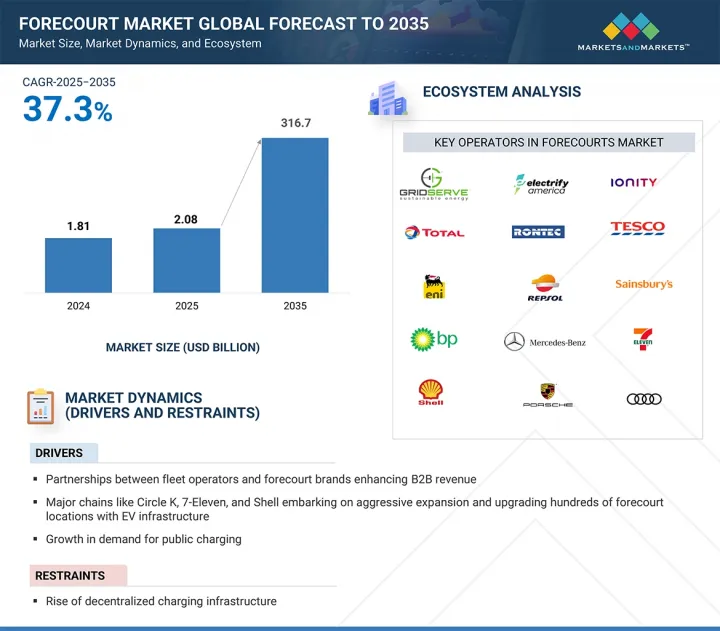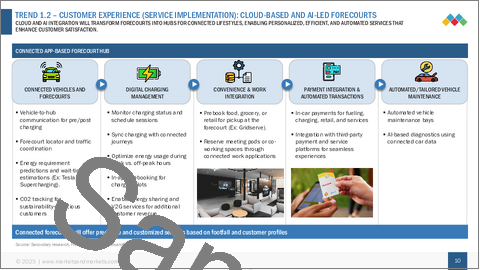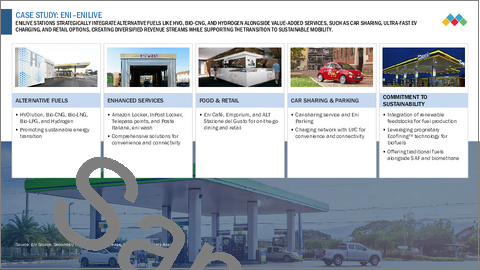|
|
市場調査レポート
商品コード
1796192
フォアコート(給油場)の世界市場:収益モデル別、地域別/国別、ビジネスモデル別、利害関係者マッピング、競合ベンチマーキング、地域別 - 2035年までの予測Forecourts Market by Revenue Model, Region/Country, Business Models, Stakeholder Mapping, Competitive Benchmarking - Global Forecast to 2035 |
||||||
カスタマイズ可能
|
|||||||
| フォアコート(給油場)の世界市場:収益モデル別、地域別/国別、ビジネスモデル別、利害関係者マッピング、競合ベンチマーキング、地域別 - 2035年までの予測 |
|
出版日: 2025年08月12日
発行: MarketsandMarkets
ページ情報: 英文 58 Pages
納期: 即納可能
|
全表示
- 概要
- 目次
給油場の市場規模は、2024年の70億米ドルから37.3%のCAGRで拡大し、2035年には3,166億米ドルに成長すると予測されています。
| 調査範囲 | |
|---|---|
| 調査対象年 | 2024年~2035年 |
| 基準年 | 2024年 |
| 予測期間 | 2025年~2035年 |
| 検討単位 | 金額(10億米ドル) |
| セグメント | 推進力別、車両タイプ別、ロードインデックス別、用途別、リムサイズ別、販売チャネル別、地域別 |
| 対象地域 | 北米、欧州、アジア太平洋 |
世界的に、各国政府はEV充電への補助金や給油場のインフラ開発を通じてクリーンモビリティを推進しています。これらの政策措置は、給油場の展開と運営における設備投資と長期的成長の両方を支援しています。

給油場市場では、主に電気自動車(EV)の急速な普及と、電動化を奨励する政府の支援政策によって、充電ポイントからの収益が最大のシェアを占めています。EVユーザーが充電ステーションで過ごす時間が長くなるにつれて、買い物や食事、車のケアといった付随的な活動に従事することが増えています。このような消費者行動は、付加価値サービスから生み出される収益を大幅に押し上げています。さらに、系統連系蓄電池システム(BESS)を統合することで、給油場は需要ピーク時に蓄電した電力を販売し、変動するエネルギー市場を活用することができます。このようなピーク時のエネルギー価格の上昇が予想されるため、エネルギー貯蔵セグメントからの収益ポテンシャルは予測期間中に大きく成長すると予測されます。
BESSやVehicle-to-Grid(V2G)のようなエネルギー貯蔵技術が急増しています。これらの技術はもはや補完的なアドオンではなく、中心的な収益源として台頭してきています。EVの普及拡大に伴い、グリッド・インフラへの圧力が高まっており、よりスマートで分散型のエネルギー管理ソリューションが必要とされています。BESSとV2Gは、エネルギーが単に供給されるだけでなく、貯蔵、管理、取引される、収益性の高い収益モデルを給油場に提供します。したがって、2025年から2035年の間に、給油場におけるエネルギー貯蔵サービスから生み出される収益は、指数関数的に成長すると予想されます。
さらに、BESSとV2Gの中核をなすリチウムイオン電池パックのコストは大幅に低下し、給油場事業者の資本支出を削減しています。電池技術が成熟し続け、規模の経済が達成されるにつれて、導入はより手頃になり、スケーラブルになります。したがって、この動向はエネルギー貯蔵サービスの採用を加速させる上で重要な役割を果たすと予想されます。
アジア太平洋では、高速道路や都市の入口付近という戦略的立地のため、給油場の入場者数は依然として高く、EV充電ポイントの設置に優先的に利用されています。これらの場所は、アクセスが良く、大量の車両を処理できるため、急速充電インフラにとって理想的な場所となっています。さらに、EV充電中の一般的な滞留時間が30分近くであることは、迅速な利便性や休憩を求める顧客の利用パターンによく合致しています。
欧州の厳しい排ガス規制とEUグリーン・ディールは、地域全体をクリーンなモビリティへと押し上げています。給油場は、EV充電インフラを設置することで適応し、自らを転換の柱として位置づけています。さらに、TotalEnergies社、BP社、E.ON社などの大手エネルギー企業は、欧州全土で給油場のアップグレードに投資し、数千の新しい充電ポイントやスマート小売ステーションの展開を支援しています。
公共交通機関やEVエコシステムの開発が進んでいることに加え、エネルギー大手による多額の投資が、欧州とアジア太平洋地域の給油場市場を牽引すると予測されます。
目次
第1章 エグゼクティブサマリー
第2章 主要な市場動向と動向
- サービスの多様化別顧客体験の向上
- 顧客体験(サービス実装):クラウドベースおよびAI主導の給油場
- 新たなユースケース:位置情報サービス
- 位置情報サービス:GRIDSEVEのケーススタディ
- 新しいエネルギービジネスモデル
- 位置情報サービス:エネルギーイノベーション別収益1.5倍の潜在的可能性を実現するグリッドサーブの事例(1/2)
- 給油場は追加収入を得ずに積極的に「太陽光発電」事業を展開(2/2)
- 好ましい規制環境
第3章 ケーススタディ
- GRIDSERVE
- ENI - ENILIVE
- CIRCLE K
- SHELL RECHARGE
- ELECTRIFY AMERICA
- PORSCHE CHARGING LOUNGE
- AUDI
第4章 ステークホルダーマッピングと競合ベンチマーク
- 給油場運営者の概要
- 競合のベンチマーク
- E-給油場および独立系給油場小売業者
- Cストア
- エネルギー参入企業
- 電子給油場ステークホルダーマッピング:将来の展望
第5章 給油場のインフラと運営コスト
- 給油場インフラ:GRIDSEVE
- E-給油場:CAPEXとOPEX
第6章 市場ポテンシャルとビジネスケース
- E-給油場の収益モデル
- 欧州の充電ポイントからの収益は、2025年から2035年の間に約33%のCAGRで成長すると予想されている
- 欧州では、給油場の6%以上にEV充電ポイントが設置されている
- 北米の充電ポイントからの収益は、2025年から2035年にかけて約44%のCAGRで成長すると予想されている
- 北米では、給油場の約3%にEV充電ポイントが設置されている
- アジア太平洋では、給油場でのEV充電により収益が2025年から2035年にかけて約33%のCAGRで成長すると予想されている
- アジア太平洋では、給油場の約2%にEV充電ポイントが設置されている
- 電子駐車場におけるBESSとV2Gの世界年間収益ポテンシャル
- 中国におけるBESSとV2Gを備えたE-給油場の予測収益とユニットエコノミクス(2024年~2035年)
- ドイツにおけるBESSとV2Gを活用したE-給油場の予測収益とユニットエコノミクス(2024年~2035年)
- 米国におけるBESSとV2Gを活用したE-給油場の予測収益とユニットエコノミクス(2024年~2035年)
- 中国、ドイツ、米国におけるBESSとV2Gの発展に関する重要な洞察
- 2024年から2035年にかけて、電子駐車場の普及率は約29%のCAGRで成長すると予測
- 充電ポイントの普及率は2024年から2035年にかけて約28%のCAGRで成長する見込み
- エネルギー貯蔵ビジネスモデルの浸透
- 戦略的結論
第7章 付録
- BESSビジネスケースの主な前提とE-給油場Sの収益性
- 戦略的結論主な前提V2GビジネスケースとE-給油場の収益性
- 戦略的結論
The forecourts market is projected to grow from USD 7.0 billion in 2024 to USD 316.6 billion by 2035 at a CAGR of 37.3%.
| Scope of the Report | |
|---|---|
| Years Considered for the Study | 2024-2035 |
| Base Year | 2024 |
| Forecast Period | 2025-2035 |
| Units Considered | Value (USD Billion) |
| Segments | Propulsion, Vehicle Type, Load Index, Application, Rim Size, Sales Channel, and Region |
| Regions covered | North America, Europe, and Asia Pacific |
Globally, governments are promoting clean mobility through subsidies for EV charging and forecourt infrastructure development. These policy measures support both capital investment and long-term growth in forecourt deployment and operations.

The revenue from charging points segment holds the largest share in the forecourts market, primarily driven by the rapid rise in electric vehicle (EV) adoption and supportive government policies encouraging electrification. As EV users spend more time at charging stations, they are increasingly engaging in ancillary activities such as shopping, dining, or vehicle care. This consumer behavior is significantly boosting the revenue generated from value-added services. Furthermore, the integration of grid-connected battery energy storage systems (BESS) enables forecourts to capitalize on fluctuating energy markets by selling stored electricity during peak demand periods. With energy prices expected to rise during these peak intervals, the revenue potential from the energy storage segment is projected to grow substantially over the forecast period.
Revenue from Energy Storage Service (BESS and V2G) segment to register highest growth
There is a surge in energy storage technologies like BESS and Vehicle-to-Grid (V2G). These technologies are no longer complementary add-ons but are emerging as central revenue streams. With the expansion of EV adoption, the pressure on grid infrastructure is mounting, necessitating smarter, decentralized energy management solutions. BESS and V2G offer forecourts a profitable revenue model, where energy is not just dispensed but also stored, managed, and traded. Therefore, between 2025 and 2035, the revenue generated from energy storage services at forecourts is expected to grow exponentially.
Moreover, the cost of lithium-ion battery packs-central to both BESS and V2G-has declined significantly, reducing capital expenditure for forecourt operators. As battery technology continues to mature and economies of scale are achieved, implementation becomes more affordable and scalable. Therefore, this trend is expected to play a key role in accelerating the adoption of energy storage services.
Asia Pacific and Europe to hold significant shares in forecourts market
In Asia Pacific, footfall at forecourts remains high due to their strategic locations-near highways and urban entry points, they are being prioritized for EV charging point installation. These sites serve as ideal locations for fast-charging infrastructure due to their accessibility and ability to handle high volumes of vehicles. Additionally, the typical dwell time of nearly half an hour during EV charging aligns well with the usage patterns of customers seeking quick convenience or rest stops.
Europe's stringent emission norms and the EU green deal are pushing the entire region toward clean mobility. Forecourts are adapting by installing EV charging infrastructure, positioning themselves as pillars of the transition. Additionally, major energy players like TotalEnergies, BP, and E.ON are investing in forecourt upgrades across Europe, supporting the rollout of thousands of new charging points and smart retail stations.
The ongoing developments in public transit and EV ecosystem, coupled with the high investment from energy giants, are projected to drive the forecourts market in the European and Asia Pacific regions.
In-depth interviews were conducted with CEOs, marketing directors, other innovation and strategy directors, and executives from various key organizations operating in this market.
- By Company Type: Energy Players-45%, Convenience stores-25%, OEMs-5%, Charging Point Operators-10%, E-forecourt Retailers -15%
- By Designation: C Level- 40%, Directors- 40%, and Others- 20%
- By Region: North America- 20%, Europe- 30%, and Asia Pacific- 30%,
The forecourts market is led by established players such as GRIDSERVE (UK), Motor Fuel Group (MFG) (UK), Rontec (UK), Circle K (US), and SHELL RECHARGE (US).
Key Benefits of Buying the Report:
The forecourts market report will help market leaders and new entrants with information on the revenue segments of forecourts, including revenue from charging, value-added services, and energy storage systems. It will also help stakeholders understand the competitive landscape and gain more insights to better position their businesses and plan suitable go-to-market strategies. The report also helps stakeholders understand the market's pulse and provides information on key market drivers, restraints, and opportunities.
The report provides insights into the following points:
Analysis of key drivers (charging points as revenue-generating hubs, rise in EV adoption), restraints (rise of decentralized charging infrastructure, cost and convenience of home charging), opportunities (monetization through BESS, V2G as a two-way revenue stream) influencing the forecourts market
Product Development/Innovation: Detailed insights into development activities, upcoming BESS and V2G project plans in the forecourts market
Market Development: Comprehensive information about the lucrative market (the report analyzes the forecourts market across varied regions)
Market Diversification: Exhaustive information about business opportunities, revenue potential, untapped geographies, and investments in the forecourts market
Competitive Assessment: In-depth assessment of growth strategies, and service offerings of leading players like GRIDSERVE (UK), Motor Fuel Group (MFG) (UK), Rontec (UK), Circle K (US), and SHELL RECHARGE (US) in the forecourts market
TABLE OF CONTENTS
1. EXECUTIVE SUMMARY
2. KEY MARKET TRENDS AND DEVELOPMENTS
- 2.1 ENHANCING CUSTOMER EXPERIENCE THROUGH SERVICE DIVERSIFICATION
- 2.1.1 CUSTOMER EXPERIENCE (SERVICE IMPLEMENTATION): CLOUD-BASED AND AI-LED FORECOURTS
- 2.2 EMERGING USE CASES: LOCATION-BASED SERVICES
- 2.2.1 LOCATION-BASED SERVICES: GRIDSERVE CASE STUDY
- 2.3 NEW ENERGY BUSINESS MODELS
- 2.3.1 LOCATION-BASED SERVICES: GRIDSERVE CASE 1.5X REVENUE POTENTIAL THROUGH ENERGY INNOVATION (1/2)
- 2.3.2 FUEL FORECOURTS ARE ACTIVELY 'SOLARIZING' OPERATIONS WITHOUT EARNING ADDITIONAL REVENUES (2/2)
- 2.4 FAVORABLE REGULATORY ENVIRONMENT
3. CASE STUDIES
- 3.1 GRIDSERVE
- 3.2 ENI - ENILIVE
- 3.3 CIRCLE K
- 3.4 SHELL RECHARGE
- 3.5 ELECTRIFY AMERICA
- 3.6 PORSCHE CHARGING LOUNGE
- 3.7 AUDI
4. STAKEHOLDER MAPPING & COMPETITOR BENCHMARKING
- 4.1 OVERVIEW OF FORECOURT OPERATORS
- 4.2 COMPETITOR BENCHMARKING
- 4.2.1 E-FORECOURT & INDEPENDENT FORECOURT RETAILER
- 4.2.2 C-STORES
- 4.2.3 ENERGY PLAYERS
- 4.3 E-FORECOURT STAKEHOLDER MAPPING: FUTURE OUTLOOK
5. FORECOURT INFRASTRUCTURE AND COST TO OPERATOR
- 5.1 FORECOURT INFRASTRUCTURE: GRIDSERVE
- 5.2 E-FORECOURTS: CAPEX AND OPEX
6. MARKET POTENTIAL AND BUSINESS CASE
- 6.1 E-FORECOURTS REVENUE MODELS
- 6.1.1 REVENUE FROM CHARGING POINTS IN EUROPE TO GROW AT A CAGR OF ~33% BETWEEN 2025 AND 2035
- 6.1.2 IN EUROPE, MORE THAN 6% OF FORECOURTS HAVE EV CHARGING POINTS
- 6.1.3 REVENUE FROM CHARGING POINTS IN NORTH AMERICA TO GROW AT CAGR OF ~44% FROM 2025 TO 2035
- 6.1.4 IN NORTH AMERICA, NEARLY 3% OF FORECOURTS HAVE EV CHARGING POINTS.
- 6.1.5 REVENUE FROM EV CHARGING FROM FORECOURT IS EXPECTED TO GROW AT A CAGR OF ~33% FROM 2025 TO 2035 IN ASIA PACIFIC.
- 6.1.6 IN ASIA PACIFIC, NEARLY 2% OF FORECOURTS HAVE EV CHARGING POINTS
- 6.2 GLOBAL ANNUAL REVENUE POTENTIAL OF BESS AND V2G IN E-FORECOURTS
- 6.2.1 PROJECTED REVENUE AND UNIT ECONOMICS OF E-FORECOURTS WITH BESS AND V2G IN CHINA (2024-2035)
- 6.2.2 PROJECTED REVENUE & UNIT ECONOMICS OF E-FORECOURTS WITH BESS AND V2G IN GERMANY (2024-2035)
- 6.2.3 PROJECTED REVENUE & UNIT ECONOMICS OF E-FORECOURTS WITH BESS AND V2G IN US (2024-2035)
- 6.3 KEY INSIGHTS ON BESS AND V2G DEVELOPMENTS IN CHINA, GERMANY, AND US
- 6.4 PENETRATION OF E-FORECOURTS TO GROW AT A CAGR OF ~29% FROM 2024 TO 2035
- 6.5 PENETRATION OF CHARGING POINTS TO GROW AT A CAGR OF ~28% FROM 2024 TO 2035
- 6.6 PENETRATION OF ENERGY STORAGE BUSINESS MODELS
- 6.7 STRATEGIC CONCLUSIONS
7. APPENDIX
- 7.1 KEY ASSUMPTIONS FOR BESS BUSINESS CASE AND REVENUE POTENTIAL OF E-FORECOURTS
- 7.2 STRATEGIC CONCLUSIONS KEY ASSUMPTIONS V2G BUSINESS CASE AND REVENUE POTENTIAL OF E-FORECOURTS
- 7.3 STRATEGIC CONCLUSIONS






